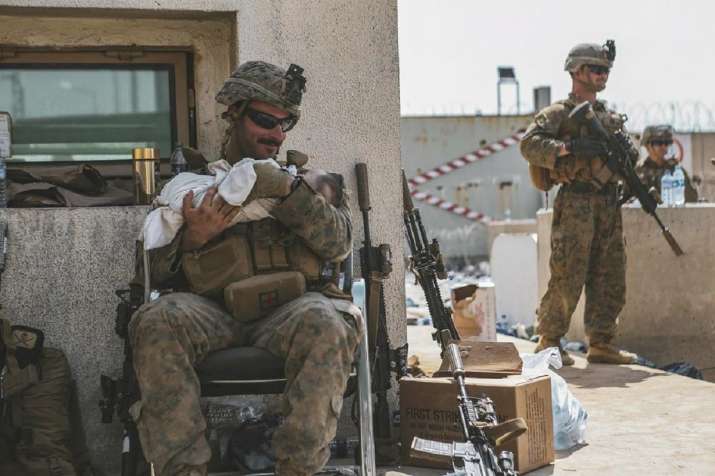
A Marine assigned to the 24th Marine Expeditionary Unit (MEU) calms an infant during an evacuation at Hamid Karzai International Airport in Kabul, Afghanistan
A media report said that the Taliban is working hard to convince the world that they will break ties with terrorist groups like al-Qaeda when they return to power in Afghanistan after 20 years and will see them as the world’s biggest leader. Recognition and approval will be required. Recently, the Taliban held their first press conference since the capture of Kabul and answered a number of questions, even as they vowed to respect women and human rights, but they remain unconvinced about regional terror groups and their future. Were silent on their strong relationship with .
The Taliban have more than two decades of ties with al-Qaeda and their proximity to Pakistan-based terrorist groups such as Lashkar-e-Taiba and Jamaat-ud-Dawa has never been a secret. But now, when the terrorist group is set to seize power, whether the Taliban will still aid these groups or leave them is unclear.
The Taliban have never confirmed their ties with terrorist groups operating in Afghanistan, but that all changed after the 2019 Doha Agreement when they signed a dotted line to ensure that they do not allow any terrorist group to carry out attacks. Will not allow Afghanistan to be used as a base for the plan. Against the US, InsideOver said.
When the Taliban took power in 1996, they began barbaric acts, violence, human rights violations and oppression of women and acted like a terrorist group in the region in the name of Sharia laws. They were recognized only by Pakistan, UAE and Saudi Arabia.
Later, he gave safe haven to former al-Qaeda chief Osama bin Laden and his terrorist group and welcomed thousands of terrorists to the region. And even terrorists are receiving training in Afghanistan under the control of the Taliban.
In 2001, as the Taliban was ousted from power, militants from both sides spent years hiding in the valleys and mountains. As time passed, the group developed a strong bond between each other as they developed familiar ties and got married in each other’s group.
These relationships are permanent and, unlike a deal, cannot be suspended. Now, that the Taliban has gained control of Afghanistan, terrorists in the region have got more security, InsideOver said.
In Afghanistan, due to geographical difficulties, it is difficult to rule in many places. Those places are safe havens for terrorists in the area.
When the Taliban captured Kunar province in Afghanistan, militants greatly praised the group’s victory because hundreds of al-Qaeda militants are believed to be hiding in the area. Kunar is the most difficult and challenging terrain in the province, making it difficult for security forces to enter the area.
Al-Qaeda chief Ayman al-Zawahiri is said to be somewhere in Afghanistan along with several other senior al-Qaeda figures. A UNSC surveillance team report at the end of July said: “Al-Qaeda is present in at least 15 Afghan provinces, mainly in the eastern, southern and southeastern regions. Its weekly Thabat newsletter has its presence inside Afghanistan. Reports on operations. Al-Qaeda in the Indian subcontinent (AQIS) operates under Taliban protection from Kandahar, Helmand and Nimroj provinces. Since the death of Asim Omar in 2019, AQIS has been led by Osama Mahmood (not listed) The group mainly consists of Afghan and Pakistani nationals, but also individuals from Bangladesh, India and Myanmar,” InsideOver reported.
The Taliban’s long history with terrorist groups and its family-based ties with terrorists from other groups has raised serious questions about the Taliban’s commitment to the Doha Agreement that it will not give safe havens to any terrorist in Afghanistan.
(with ANI inputs)
Read also | Taliban official websites go offline, though reasons unknown
.